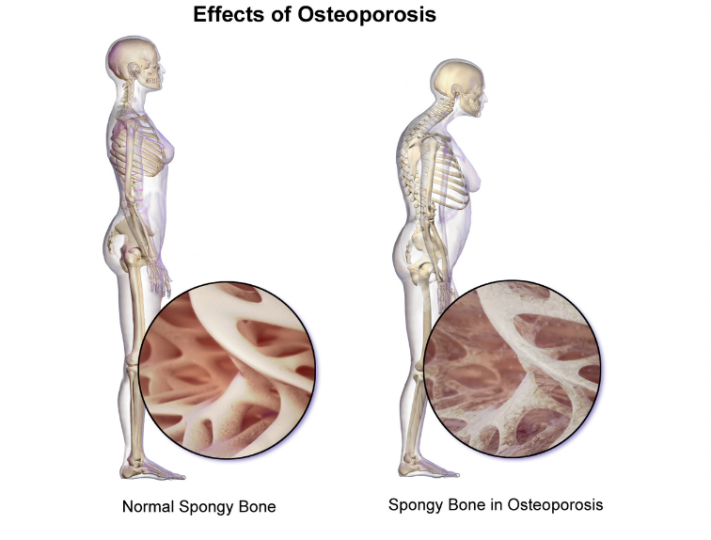What I Learnt Last Week 14: Noise and The Brain, Your phone as a microscope, Osteoporosis' treatment, Ebola Vaccines, & The Lips movement and hearing
| Please make sure you carefully check the number of a paragraph before reading it to ensure you don't make mistakes with the arrangement. You might also need to use a desktop view to fully optimize this page. Thank you |
Another superb week is here again. I know most people look forward to this series. Well, just as you look forward to it, so do I. I always try to compile a list of what I learnt during the week and trust me, it's not always easy. Sometimes, I get lost trying to recall my lesson for a day if peradventure, I forgot to write it down after the day.
This week I did a lot to make sure this episode comes out early enough. It's even a pity I sleep off sometimes when I'm tired due to the stress I subject myself most times. Thank God, I didn't sleep off now. Okay, let's go to what we came for....
Monday: If you're sensitive to noise, blame your brain

[1] Some people might not even have heard about this before, majorly because it's not a common condition. Those that know about it either have it or know someone who does. Well, people like me are sensitive to noise but that's only when am awake. Once I sleep, I ain't sensitive to noise unlike my sister who's sensitive to noise when she's asleep and awake, it's all the same to her.
[2] Different estimates have made it known that only about 20 - 40% of the healthy people are sensitive to noise, a situation that makes them less-tolerant to it. Like myself, I find it hard to read when it's rowdy let alone noisy and have a friend who reads best in a rowdy or noisy environment I don't know why it's that way but I can tell you this reflective of the fact that our brains are built differently.
[3] Now, do you know that a human's sensitivity to noise can be measured physiologically in the brain? ...and that the way the brain is built plus the way it functions in the processing of sound can help us differentiate between people who are highly sensitive to noise and those who are just indifferent?? Yes, a proper brain scan would definitely clear your doubts in this one.
[4] Probably you are thinking noise sensitive individuals might not like music... Hey, don't get it twisted! Music ain't noise. Noise sensitive individuals can even be musicians but the issue is having to play music in the background. This sensitivity to noise is caused by the alteration of the neuronal response to "unexpected sounds" or noise.
Tuesday: Your phone can be a microscope

[1] Now, am not talking about just any microscope, I mean a scientific one. I know how much I wanted a microscope when I was much younger, I don't know if it applies to everyone the same way but I know for sure that I wanted one then.
[2] Scientists have now made this easier by making a clip-on device that you just attach to your phone and then you have the microscope. Well, there is a tendency of it looking childish but you don't want to look at that because it can see microscopic organisms as small as 1/200th of a millimetre - that's small right?? Yes, it is.
[3] Maybe I forgot to say that the microscope is free and you just have to print and fix it yourself. In addition, it does not need some external power source of even some difficult installation procedure-just clip-onto your phone and it'll do just fine
[4] Is this completely novel? No, there had been smartphone microscope earlier but they never turned out to be this effective and useful maybe because of the absence of light in those smartphones which is now a thing of the past as our new smartphones now have flashlight beside their cameras-the reason there wouldn't be a need for external light anymore.
Wednesday: Osteoporosis' treatment might just be on its way

[1]Would it make any sense just jumping to osteoporosis having left out the basics of it?? Of course not. I believe am educating an audience of scientists as well as non-scientists which means there's a very high possibility they don't even know what osteoporosis means or might even mean. So, let me do the needful by starting from the scratch in a very brief way.
[2] Okay, Osteoporosis is a bone condition characterized by pores or holes in the bone which literally means that the bone is unable to keep nutrients or retain nutrient. Now, what would a bone unable to keep nutrients be like? Firstly, it would be weak as it can't hold the necessary nutrients for strength. Secondly, the bones wouldn't grow or were you expecting growth?? Of course not, the nutrients make it grow and when there's none🤷🏾♂?? The opposite happens! Thirdly, most people with osteoporosis ain't able to stand upright because of the weakness or fragility of the bones.
[3] Osteoporosis might not be very known but it definitely affects millions of people globally-the reason scientists keep researching on it. The aim is to make brain grow regardless of the fact that it can't retain nutrients. Well, if you'll ask me how they plan to achieve that? I'll just say by altering the structure of sugar chains on the stem cells.
[4] Sugar chains may not be something you learn at school, but they are extremely important as they coat all cells in your body. They are quite complex and arrange themselves in random structures. However, at the same time, they are very important because they support the immune system and define blood groups. Scientists wanted to see what would happen if they used a common laboratory chemical kifunensine, which alters sugar chains, on stem cells that make up bone tissue.
Thursday: Ebola Vaccines

[1] Ebola the endemic disease that struck the Western part of Africa a few years ago is an unrepentant killer that claims several lives at the time it spread. It's a viral haemorrhagic fever that happens to be severe and fatal. It's symptoms start showing after two days of infection and as crazy as the infection is, it doesn't die even when it has successfully killed its victims but that's not where we are going.
[2] The Ebola used to spark fears in the minds of people. I remember the time it got to Nigeria, we couldn't shake hands even in church because we were scared of contracting it as it's incurable which means once it's contracted, next thing is death, lol. Now, it appears we wouldn't need to be so frightened about Ebola in the long run but you can still remain frightened for now😂 as the vaccines have not been tested clinically which means we can't be sure of their effectiveness for now.
[4] The plan is to make vaccines for Ebola so that people can get a chance to survive it. "The technology behind this vaccine(Delta VP30)" to be put to use now was invented about 10 years ago by Peter Halfmann, an Ebola Virus expert. The Delta VP30 happens to be another form of Ebola Virus itself. It's just usable because it's noninfectious due to its loss of a critical gene out of the 8 it has in its genome.

[5] Vaccines work by exposing the immune system to viruses or parts of viruses. The Delta VP30-based vaccine may offer better protection against Ebola virus than others in the pipeline, Kawaoka says, because it is a whole-virus vaccine. Other Ebola vaccine candidates use vector viruses to ferry a single Ebola protein, a surface antigen, to prime the immune system

Yoshihiro Kawaoka
Prof. of Veterinary Medicine, UW-Madison
[3] It's good news especially for those countries that lost lives and even their economy to the disease between the year 2013 and 2016. At least they know there's a vaccine somewhere even though the efficiency will have to be tested later.
Friday: The lips and what we say

[1] Ever wondered why it is easier to hear what a person is saying by looking at the lips in a noisy environment? It's so funny that I do this usually not knowing it is actually scientific.
[2] Scientists have been able to shed more light on this topic. Until I stumbled on this, I never knew how it happens. It is said that this is one of our brain tricks and it happens because the sound we hear matches what we see on the lips of the speaker. Whenever this is happening, this trick is that the auditory cortex of our brain increases the sound of what the speaker is saying and this means the sound our brain focuses on is determined by what we are looking at.
[3] Since this type of hearing depends solely on what we see and not what we hear, I think it'll work for people with hearing disabilities too because they can at least read the lips of the speaker. Even people with hearing aids and cochlear implants could get a little help from trying out this method.
[4] Scientists used the ferret as an animal model after which they proceeded to do a human test. After these tests, they were able to discover that we don't usually look at the speaker's lips because we have lip-reading skills but because we are unknowingly helping our brain decide which sounds it should amplify. This shows there's a direct link between our eyes and brain.

While the auditory cortex is focused on processing sounds, roughly a quarter of its neurons respond to light – we helped discover that a decade ago, and we’ve been trying to figure out why that’s the case ever since

Dr. Jennifer Bizley
Thank you for coming around!!
That little boy, @pearlumie.

Proud Member of @steemstem
Join us on discord and rub minds with other science geeks.
Proud Member of @genesis-project
You want to join genesis-project, contact @ehiboss, @samminator, @ememovic, or @camzy, and please ignore the scammers, you don't have to pay to join @genesis-project.
Proud Member of @air-clinic
Join air-clinic's discord server. Medical practitioners needed. Anybody from any field is free to join, we do daily lectures and consultation services are available.
Contact @nairadaddy for more info.
Being A SteemStem Member
My great scientist, i want to be like you when i grow up.
3.osteoporosis??? New word, thanks
Thank you @pearlumi
This is a clearly well researched article and I love your arrangement. You must be a genius o... I read your posts sometimes, and I am like "this guy is really trying o" please, how do you do it?
Great research and brilliantly written👍 Thanks for the share
I know people who are like that too, and it's so strange to me, since I too work best when it's quiet and find it difficult to work when it's noisy or busy around.
The smartphone microscope sounds neat. Now all we need is a 3D printer and we're in business!
When you're in the mood for a laugh, do you watch horror movies?!
Can the brain amplify sounds? Maybe you/the scientists mean that the brain decides to ignore certain sounds, and pay more attention to some, hence "amplifying" them?
Exactly!
Lol, maybe you know, you are just trying to get words out of my mouth. I think that was what I stated but even if it was not, you're right..
You are a good researcher
Hello @pearlumie, some of the images used on this article are from copyrighted source. Please review the image policy of @steemstem concerning the use of images here.
Oops! I didn't know.. I've edited the images..
Ok
Wow!
You are doing a great job @pearlumie
I must say putting up this article isn't easy. Good research, exceptional writeup. I love the Friday lesson on
I learnt a lot on the said topic. Well-done boss.
This is absolutely fantastic...I am proud of you..Nice work